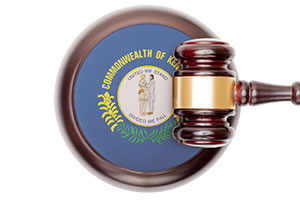Kentucky State Police expert witnesses testified about their analysis of forensic evidence in the trial of George Walker for murder and tampering with physical evidence.
The Murder
On December 21, 2015, Allison Walker was reported missing by her husband, Chris. Logan County Deputy Sheriff Kyler Harvey questioned Chris Walker’s brother, George, about Allison’s disappearance.
Harvey reported that George initially said that he heard “in the wind” that Allison Walker’s body was in the nearby Red River. Later in his interview, George admitted to choking Allison, tying her hands and feet with rope, and dragging her to the river and dumping her body. George led authorities to the spot where Allison Walker’s body would later be found by the Logan County Search and Rescue.
On December 23, 2015, Allison Walker’s body was found in the Red River, 200 yards from where George had indicated. Her body was wrapped in a blue tarp and bound with rope.
The Trial
George Marshall Walker, 22, of Adairville, Kentucky, was charged with murder and tampering with physical evidence in the death of his sister-in-law, Allison Walker.
During opening statements, George’s attorney Nathan Beard argued that George did not kill Allison; he confessed to keep his brother Chris from being arrested.
The Kentucky State Police presented numerous expert witnesses to testify about the forensic evidence found in the case.
Amy Burrows-Beckham, assistant medical examiner for the state, testified about the autopsy that she conducted on Allison Walker’s body. Burrows-Beckham determined that Allison died from asphyxiation from strangulation. Drowning may also have been a factor in the death, although how a person who has stopped breathing as the result of a strangling can drown is something of a mystery. Time of death could not be established because Allison’s body had been placed in cold water, so there was no decomposition.
Jon David Clem, forensic chemist with the Kansas State Police Central Lab in Frankfort, testified about his analysis of the rope that was found on Allison’s body compared to the rope that was found in the laundry room inside her home. While Clem could not make a physical match because of the frayed ends of the rope from the laundry room, he found that both ropes shared identical construction and contained the same fibers.
Alison Tunstill, forensic biologist with the Central Lab, testified about the vaginal swabs that were collected from Allison Walker’s body. Tunstill testified that the male-specific DNA sample that she analyzed was not large enough to determine whether it came from either George or Chris Walker. George Walker had told investigators that he had sex with his sister-in-law on the night that she died.
Sabrina Christian, forensic biologist with the Central Lab, testified about the cervical swabs obtained from Allison Walker. Christian testified that the swabs showed DNA consistent with a second person, but the sample was too limited for her to determine if it belonged to either George or Chris Walker. Christian also testified that Allison Walker’s underwear was analyzed and that it tested positive for the saliva of Allison Walker and Chris Walker.
Verdict
The jury found George Walker guilty of both murder and tampering with evidence. He was sentenced to 55 years in prison.




